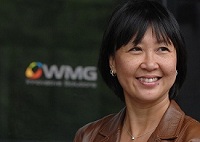WMG News - Latest news from WMG
WMG Professor named as one of this year’s Women to Watch
 WMG's Professor of Marketing and Service Systems, Irene Ng, has been featured in the annual Women to Watch supplement, compiled by Cranfield University.
WMG's Professor of Marketing and Service Systems, Irene Ng, has been featured in the annual Women to Watch supplement, compiled by Cranfield University.
The 2019 edition features 50 Black, Asian and other Minority Ethnic (BAME) women, showcasing inspiring professionals who come from backgrounds historically under-represented in the senior leadership pipeline.
Professor Ng said: “ I am honoured to be featured in the Women to Watch supplement. It is so important that we continue to look around our own contexts and lives to be mindful of representations, whether it’s BAME or other minority views.”
Businesses should tap into diverse talent pool
Cranfield University’s Female FTSE Board Report, launched today [11 July], reveals that only 11% of women on FTSE 100 boards are from BAME backgrounds.
Dr Doyin Atewologun, Director of the Gender, Leadership and Inclusion Centre, says: “We need to be sure that we are not only advancing progress for a certain small group of women, but are truly pushing board diversity in every sense. We hope executive search firms, FTSE Board Chairs and other Directors are inspired by the rich talent we highlight, to look at gender diversity - including men - in a different way.”
Women of colour are missing from the boardroom
The Women to Watch supplement was introduced by Cranfield University’s Gender, Leadership and Inclusion Centre in 2009, and is this year compiled in collaboration with The Network of Networks BAME – Multicultural Chapter (TNON) and the Black British Business Awards.
Melanie Eusebe and Sophie Chandauka, Co-Founders of the Black British Business Awards said: “In 2019, it is simply unacceptable for any FTSE 350 nomination committee to refer to the common refrain that there are no Black Asian and other Minority Ethnic (BAME) women on boards because the talent does not exist. Women of colour are often missing from the boardroom inclusion discourse, from the search firm shortlists and, ultimately, from the PLC board. The BBBAwards joins Cranfield University in this bold step to disrupt the status quo by declaring, through the profiles of these 50 impressive women, that BAME women of commercial excellence and tenure exist in substantial numbers.”
Diane Greenidge, Founder of TNON, said: “These inspiring women, already leaders in their respective fields, have the potential to bring the power of greater diversity to UK boardrooms. We join Cranfield University in urging businesses to realise the positive impact that women from a broader range of backgrounds can have on their success.”
It’s a hat trick!
Three WMG Professors have now joined the The Alan Turing Institute as Fellows.
 Our Professor of Cyber Systems Engineering Carsten Maple, Professor of Data Science, Giovanni Montana, and Professor of Marketing and
Our Professor of Cyber Systems Engineering Carsten Maple, Professor of Data Science, Giovanni Montana, and Professor of Marketing and  Service Systems Irene Ng; are now all part of the prestigious line-up of expert Fellows.
Service Systems Irene Ng; are now all part of the prestigious line-up of expert Fellows.
The Alan Turing Institute is a national body championing data science and artificial intelligence research. It was created by five founding universities - Cambridge, Edinburgh, Oxford, UCL and the University of Warwick plus the EPSRC, with a further eight new universities – Leeds, Manchester, Newcastle, Queen Mary University of London, Birmingham, Exeter, Bristol, and Southampton – joining in 2018.
Privacy and trust in children’s e-books is first focus for new £1.2m study of our future connected world
WMG at the University of Warwick have secured £1.2m grant funding from the Engineering and Physical Science Research Council (EPSRC) to explore how decentralisation, personal data, and our Internet-connected possessions come together on the Hub of all Things (HAT) platform. The first focus of the WMG team’s project will be issues of privacy and trust in children’s e-books.
The WMG team’s Dynamic, Real time, On-demand Personalisation for Scaling (DROPS) project is a collaboration between academics at the universities of Warwick, Surrey, and the West of England. It will examine the privacy, trust, and identity issues that arise from the development of personalized e-books for children's reading. The researchers’ focus on children's reading is motivated by evidence that shows that despite the value of personalised e-books for learning and reading enjoyment, there is a lack of research that engages with the range of privacy issues that these technologies introduce.
Working with the HAT Community Foundation, a non-profit promoting the use of HAT micro-servers for decentralized, person-controlled personal data, the DROPS project will investigate the technology, business, economic, and legal models of personalisation in a newly decentralised digital economy.
